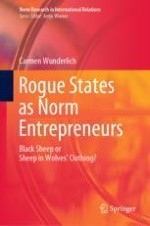2020 | OriginalPaper | Buchkapitel
3. Against the Norms of International Society: Rogues, Outlaws, and Pariahs
verfasst von : Carmen Wunderlich
Erschienen in: Rogue States as Norm Entrepreneurs
Aktivieren Sie unsere intelligente Suche, um passende Fachinhalte oder Patente zu finden.
Wählen Sie Textabschnitte aus um mit Künstlicher Intelligenz passenden Patente zu finden. powered by
Markieren Sie Textabschnitte, um KI-gestützt weitere passende Inhalte zu finden. powered by
